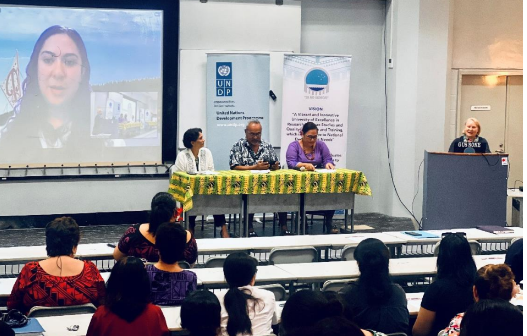Enhancing women’s capacities and developing more effective gender equality
platforms as part of Blue Economy strategies are key in its success.
These are also two of the main reasons behind a policy dialogue held at the National University
of Samoa (NUS) today.
The Blue Economy refers to a wide range of economic activities including fisheries and
aquaculture, marine protected areas, ports and shipping, coastal infrastructure development,
renewable energy, and marine tourism, among others.
Co-hosted by NUS and the United Nations Development Programme (UNDP), the policy dialogue
aims to provide a discussion space for the exchange of experiences on leveraging sustainable
blue economy strategies for gender equality.
“The 2050 Strategy for the Blue Pacific Continent signifies a shift in mindset towards our sea of
islands, emphasizing the importance of ocean resources to our region’s well-being. By promoting
gender equality in the blue economy, we can empower women to participate, supporting a
sustainable and balanced blue Pacific,” said Professor Tuifuisa’a Patila Amosa, NUS Vice-
Chancellor & President.
The policy dialogue will also provide an opportunity to draw on the experience of stakeholders
that engage in blue economy activities across Samoa and the region to identify best practices,
gaps, challenges, opportunities and lessons learned in engaging women and girls and striving
towards gender equality in the blue realm in the Pacific.
The dialogue will also provide a space for participants to generate recommendations for
promoting and striving towards gender equality as part of the sustainable blue economy
strategies.
“The blue economy offers a wealth of opportunities for furthering gender equality, for example:
by recognizing the traditional role women played in maintaining a harmonious relationship with
the ocean, for instance the sustainable culture and harvesting of coastal reef marine resources;
and by supporting youth and women employment and entrepreneurship skills development, to
make the most of the economic and livelihood potential while preserving and restoring ocean
health,” said Kanni Wignaraja, UNDP Regional Director for Asia and the Pacific.
A summary report of the dialogue will be produced and shared publicly.
A Memorandum of Understanding between NUS and UNDP was also signed at the completion of
the policy dialogue. The purpose of this MOU is to provide a framework of cooperation, and
facilitate and strengthen collaboration between the two organisations for deepening policy
advocacy by collaborating with NUS to enhance public discourse on topical issues and impact the
development agenda of the country through Policy Dialogues, thus leaving no one behind and
ensuring equity and fairness.

